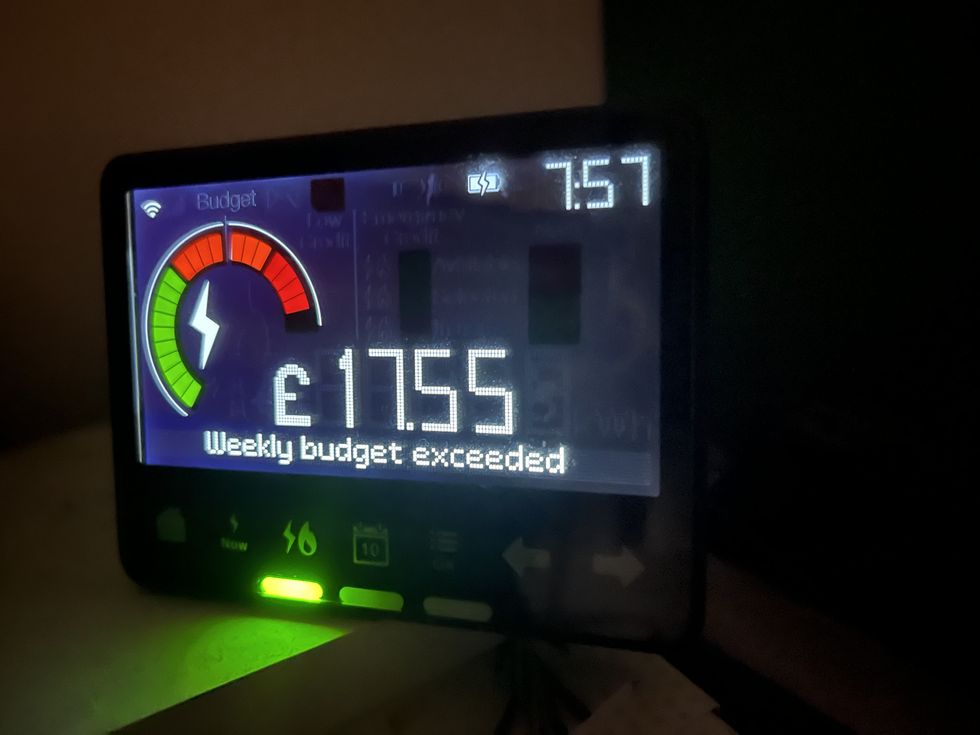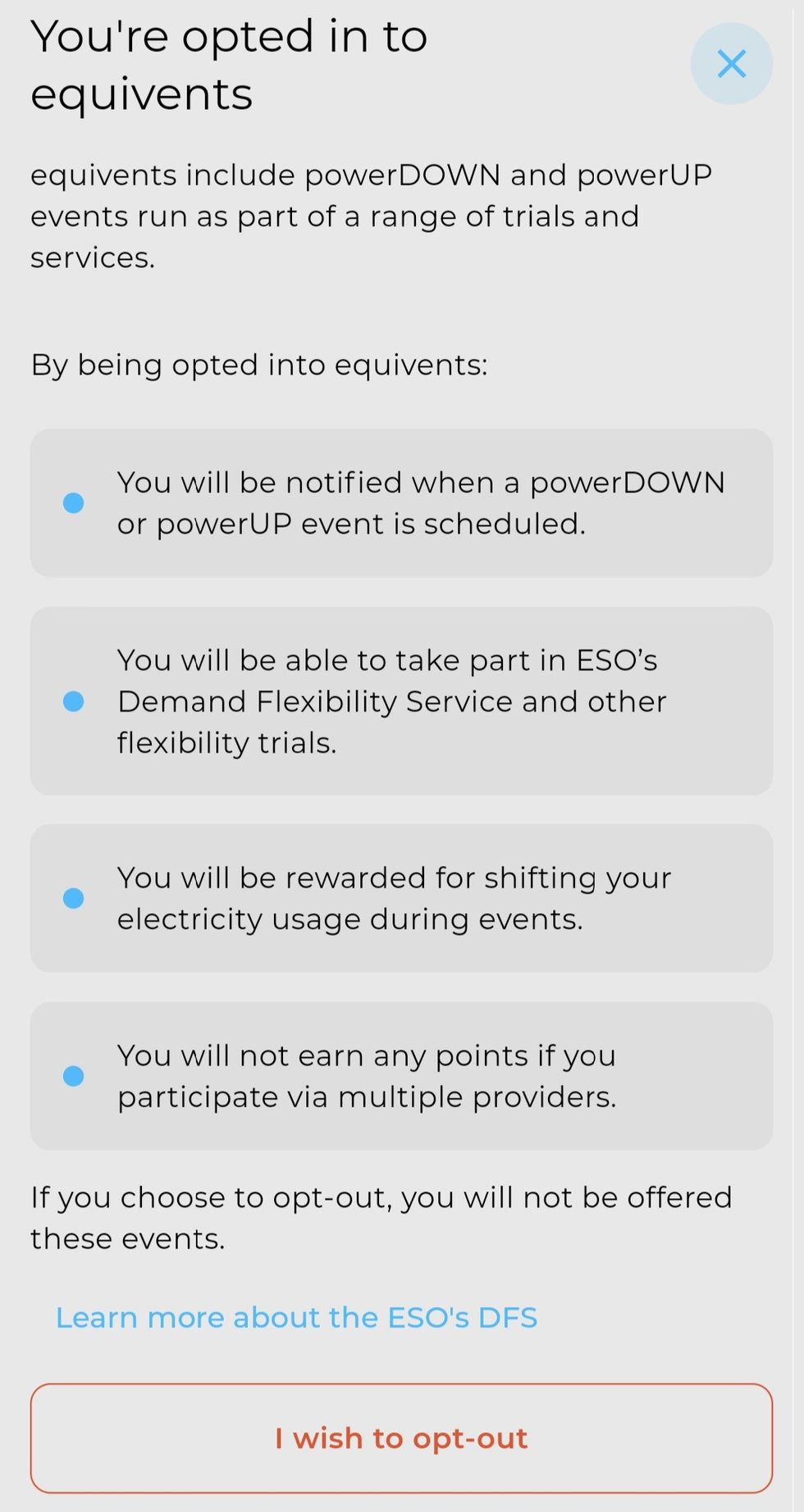‘I’ve earned a £30 voucher just by tapping a button and changing when I use electricity’
Getting rewarded to postpone chores seemed too good to be true, but purposeful procrastination has paid off – I’ve ended up with £30 in supermarket vouchers.It’s taken some time – I began accruing the rewards last winter – but for something which hasn't affected my day to day life in any way, thirty quid off the food shop is nothing to be sniffed at.Since January last year, I’ve been taking part in equiwatt’s “powerDOWN equivents”.I’m lucky that, thanks to living in a well-insulated property, my energy bills are relatively low.But I wanted to see what these energy shifting events were like for myself, and also see if I could make money go a little further in the process.The scheme aims to shift a household’s electricity usage in response to signals from the grid operator or energy market, and participants can earn points for taking part.I was disappointed to find out my energy supplier hadn't invited me to sign up to its Demand Flexibility Service scheme last January, but then I realised I could join up via this app instead.To get started, I input some details, including some numbers on the back of my smart meter, and then it was just a matter of “opting in” and shifting energy usage.Thankfully, delaying the washing machine and dishwasher has fit in within my lifestyle, and sometimes a 5pm - 6pm equivent coincided with a trip to the supermarket, when the lights and hob were switched off anyway.This week marked my 50th equivent, and over time, I've accrued thousands of points. The app also says it’s saved 6.46kg of CO2.That said, £10 of my vouchers have come from winning a 1,000 bonus points prize in the app’s monthly prize draw - equiwatt offers a prize for 100 people who take part in the powerDOWN events each month.The other £20 was from using less energy than forecast during the event, however.My home is fairly energy efficient, and there have been times when a change in routine has meant usage during the event was higher than forecasted.It wasn’t something to worry about though - it just meant I didn’t earn any points for that hour.I soon found that forcing the whole household to sit in the dark for an hour wasn’t going to be worth it, and I stopped thinking too much about the events.I’d get a notification on my phone now and then, requiring me to tap to opt in. I often did so, just in case I hadn’t gotten around to the chores by the time the event began.Sometimes I’d take part in a session without having made the commute home, meaning I could earn points while still at work.LATEST DEVELOPMENTS:Energy tariff switchers warned ‘small print’ could cost extra £716 above price capWill your energy bills REALLY get cheaper with a smart appliance? We quizzed a Samsung exec'I pay tax on state pension - do I need to file tax return?' Jasmine Birtles repliesI’ve heard of others who have made substantially more money from these kinds of events, while others don’t think the effort to take part outweighs the rewards potential.I suppose it will come down to individual and household needs and preferences.For me though, I think it’s been worth doing the laundry on the weekend, in exchange for money off my grocery bills.


Getting rewarded to postpone chores seemed too good to be true, but purposeful procrastination has paid off – I’ve ended up with £30 in supermarket vouchers.
It’s taken some time – I began accruing the rewards last winter – but for something which hasn't affected my day to day life in any way, thirty quid off the food shop is nothing to be sniffed at.
Since January last year, I’ve been taking part in equiwatt’s “powerDOWN equivents”.
I’m lucky that, thanks to living in a well-insulated property, my energy bills are relatively low.
But I wanted to see what these energy shifting events were like for myself, and also see if I could make money go a little further in the process.
The scheme aims to shift a household’s electricity usage in response to signals from the grid operator or energy market, and participants can earn points for taking part.

I was disappointed to find out my energy supplier hadn't invited me to sign up to its Demand Flexibility Service scheme last January, but then I realised I could join up via this app instead.
To get started, I input some details, including some numbers on the back of my smart meter, and then it was just a matter of “opting in” and shifting energy usage.
Thankfully, delaying the washing machine and dishwasher has fit in within my lifestyle, and sometimes a 5pm - 6pm equivent coincided with a trip to the supermarket, when the lights and hob were switched off anyway.
This week marked my 50th equivent, and over time, I've accrued thousands of points. The app also says it’s saved 6.46kg of CO2.
That said, £10 of my vouchers have come from winning a 1,000 bonus points prize in the app’s monthly prize draw - equiwatt offers a prize for 100 people who take part in the powerDOWN events each month.
The other £20 was from using less energy than forecast during the event, however.
My home is fairly energy efficient, and there have been times when a change in routine has meant usage during the event was higher than forecasted.
It wasn’t something to worry about though - it just meant I didn’t earn any points for that hour.
I soon found that forcing the whole household to sit in the dark for an hour wasn’t going to be worth it, and I stopped thinking too much about the events.
I’d get a notification on my phone now and then, requiring me to tap to opt in. I often did so, just in case I hadn’t gotten around to the chores by the time the event began.
Sometimes I’d take part in a session without having made the commute home, meaning I could earn points while still at work.
LATEST DEVELOPMENTS:
- Energy tariff switchers warned ‘small print’ could cost extra £716 above price cap
- Will your energy bills REALLY get cheaper with a smart appliance? We quizzed a Samsung exec
- 'I pay tax on state pension - do I need to file tax return?' Jasmine Birtles replies

I’ve heard of others who have made substantially more money from these kinds of events, while others don’t think the effort to take part outweighs the rewards potential.
I suppose it will come down to individual and household needs and preferences.
For me though, I think it’s been worth doing the laundry on the weekend, in exchange for money off my grocery bills.







































